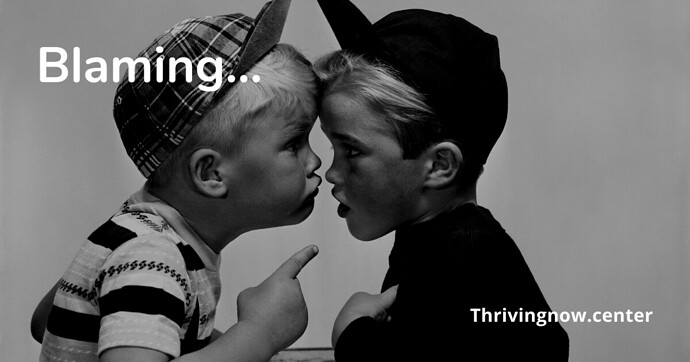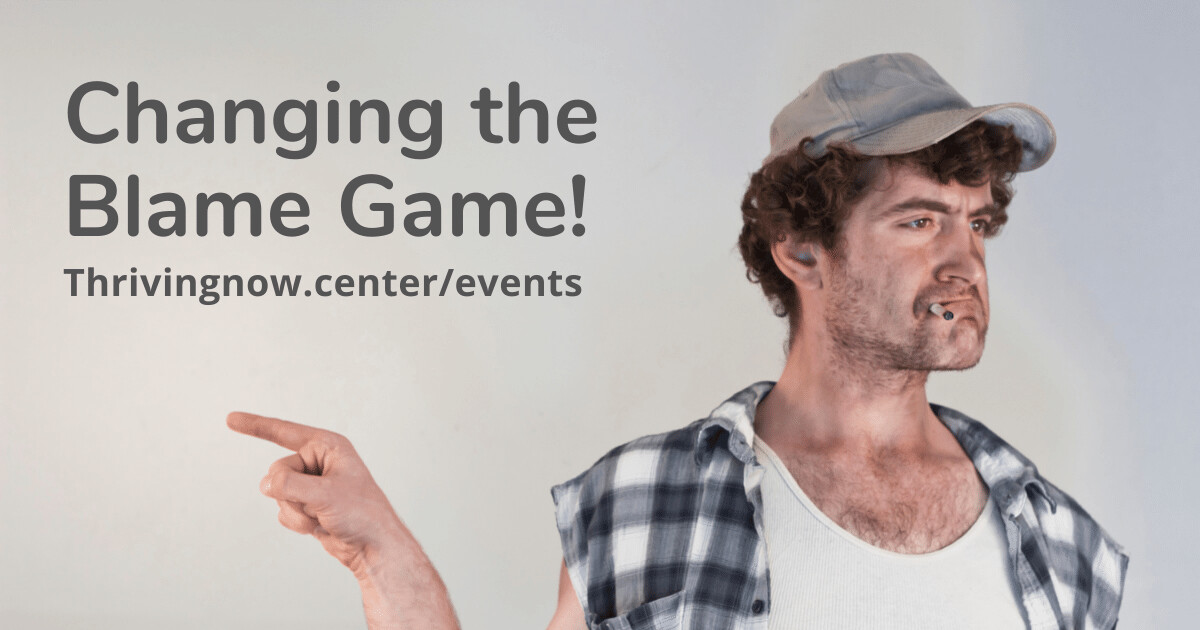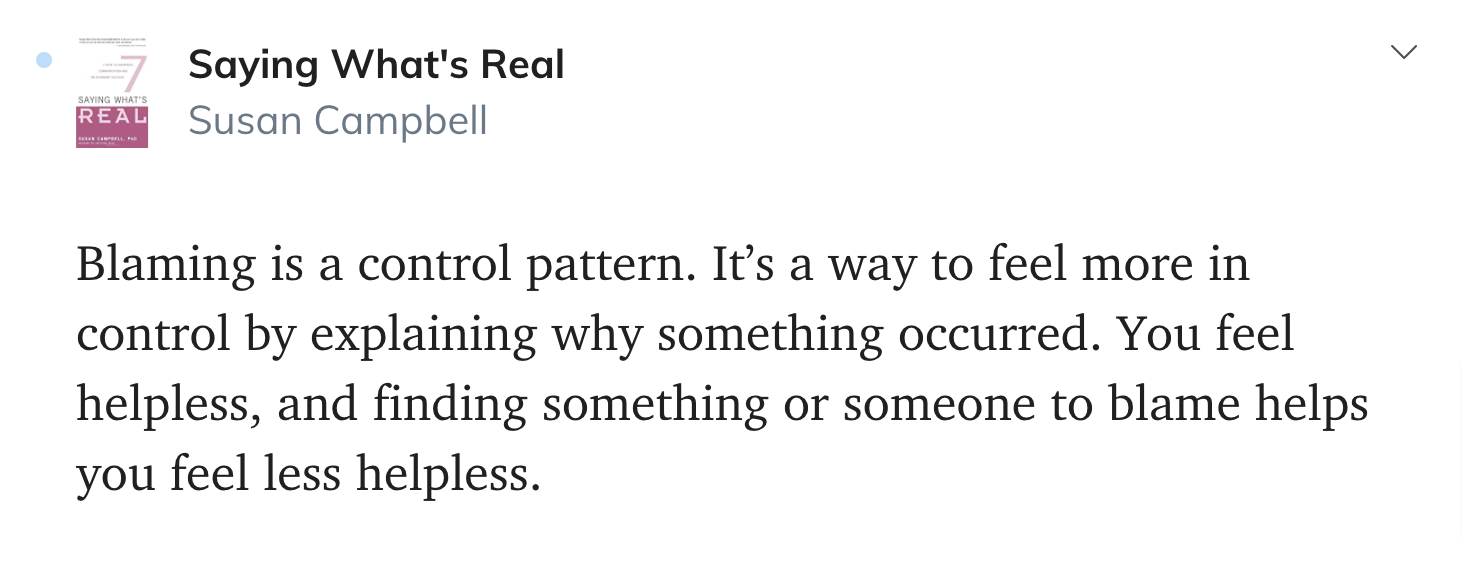Blaming. I’d like to invite us first to honor that this is a sensitive subject. The energy of blame is potent! When blame lands on us or in us, a flame of burning shame can engulf our energy field.
Who hasn’t been blamed? Who hasn’t done blaming?
- What do we do with all that energy?
- Does it belong to us?
- What part of this is ours… what is theirs… and what if it is actually no ones to “own”?
Let’s share a definition
Blame (v.): assign the responsibility for something bad to (someone or something).
Examples of Blaming
The Foot Stomp
A person is sitting quietly reading in a chair. Someone else comes up and stomps on their foot.
Seems really straightforward. Getting ones foot stomped on is a bad thing. Being attacked when we’re not doing anything threatening is a bad thing. The person who did the stomping is clearly… the one doing the stomping… thus is responsible for the bad thing happening.
Blame… assigned… the person who did the stomping is to blame!
Whew! It’s a relief, isn’t it, to have something so clear cut. Black & White.
I almost want to stop there and not do any more examples. ![]()
The Hair Pull
Sitting quietly reading in bed, another member of the household comes in and asks a question, “Why did you take the book I was reading without asking?!?!?” No answer.
HAIR PULL! BOOK GRAB! RUN FROM THE ROOM!
Oh dear. Who is to blame here? The thief? The hair puller?
And what if the Foot Stomp was by the person who had their hair pulled?!?!
Waters. Muddied.
Stealing to Meet Needs
What if Stomp and Hair Pull grew up like this:
Their parents were disconnected… one through depression and the other through alcoholism. Basic needs for regular meals and clothing were unmet. Loving touch? No. Safety? What’s that!?!
And, it turns out when Mom was drunk or Dad was hiding in his basement, money could be taken from their wallets to buy extra food and even clothes. They never noticed.
But if they ASKED (no matter how nicely) for money or more food or clothes that fit, they were blamed for the resulting anger… told they were selfish and greedy and BAD.
And if either parent needed something – like to get their anger and frustration and helplessness out, they grabbed, hit, pulled, and pushed. Spanked. Yelled!
As kids they were ignored… or subjected to seemingly random physical and emotional punishment.
Blamed for having needs. Physically hurt when parents couldn’t handle life. And blamed for being the cause of the punishment, too!
Is taking instead of asking for a book now something to be blamed for? How about pulling hair to get back what was taken?
Figuring out who is ultimately to Blame can be like swimming in a cesspool.
What about extenuating circumstances?
The more we learn about people’s secret stories, their childhood traumas, the systems and sub-cultures that pressured and forced them to cope, the more I believe we see that extenuating circumstances are… everywhere.
Extenuating circumstance (n.): a circumstance that renders conduct less serious and thereby serves to reduce the damages to be awarded or the punishment to be imposed.
My mom called them excuses, as in “I don’t want to hear your excuses. What you did was wrong!”
Yeah, excuses… circumstances.
We want to be understood, forgiven, found not guilty, or at least have our punishment reduced.
Truth is, as a parent and a human, I don’t find too many cases where someone doesn’t have an “excuse.” A circumstance. A belief or ignorance or different values or desperate need. That doesn’t make what happened OK! And it doesn’t mean we’ll always be able to understand what got into someone who did THAT (whatever unwanted thing that was)!
To me it means…
It’s natural for people to be defensive.
We are designed to defend not only ourselves from physical threat but also attacks on our psyche, our sense of who we are, or our status. These are innate, primal characteristics of the human being. Our primitive brain has fight (defend) as one of the options.
Inner critic (or outer critic): Why are you being so defensive?!?
Primitive brain: Because we’re being attacked!
I’ve done a LOT of emotional work to stay calm and confident, present, listening, safe, respectful. And I gotta tell ya, when the energy and attitude of intense blame is directed at me – someone trying to assign me the sole responsibility for something BAD that happened – my primitive brain kicks in. I’m flooded with chemicals for defense.
I’m human, and I don’t want to take in (consume energetically) what is being scooped from the cesspool.
It’s also natural for people to accept blame easily – even all the blame.
Some of us get all fight or flight when it comes to getting blamed.
For others, and for me for a long time, it was freeze/fawn – states of last resort when it comes to threat.
Do you feel that almost everything is your fault?
If so, what situations taught you that?
Because while it is “natural” (built into our human operating system) for people to adopt that posture of accepting any blame that comes their way – even pre-blaming themselves for stuff that hasn’t even happened yet – it’s a trauma response.
If you were ever trapped in a situation where you were forced to “accept” the blame… to embody the shame heaped on you… and you were punished for things no reasonable person would consider your fault… well, it sets in motion taking the blame.
Take the blame quickly and the punishment just might be less, right?
I’ve asked clients, “What would have happened if you had calmly and confidently said, ‘No… I am not to blame for your misery and anger.’ ?” Those that take on the blame virtually all agree: “Oh, that would NOT have been safe! It would have been worse.”
It’s survival smart to accept blame – even when it is not ours – if the alternative is more dire threat and abuse.
Are you smelling the cesspool that is blaming? Makes me nauseous.
I promise that we’re going to explore some positive possibilities before we are done here. But before that, I need to speak to a painful situation too many caring, empathetic beings find themselves in. Being blamed by someone we care about…
Blamers feel “better” by blaming…
When Susan Campbell shared this in her book, it got my attention:
Thus, blaming feels “better” because it identifies the cause. And, it takes all the energy and lays it outside… elsewhere… on someone-elses.
There’s both release and some protection. Sometimes it even gets the blamer (victim of the bad thing) some support.
And, this pattern of blaming is well-understood to be disempowering. But just because something is disempowering and blocks self-healing isn’t enough to get someone to stop.
I’ve never met someone who chronically blames others and who feels the victim… that wasn’t actually victimized and traumatized in significant ways in their lives, including all-too-often in their present circumstances, too.
Healing from this emotional state is hard.
People living and loving the person stuck in blaming can get so frustrated they often say things like, “Stop being the victim! Stop blaming everyone else for your troubles!” As if that works…
Others, especially those with emotional self-development practices and sensitivity and empathy can leave themselves open for…
Blame-taking-in.
Blame-taking-in in my experience isn’t the same as taking the blame. It’s like this:
“I love this person. I want to own my own stuff. I know I am far from perfect. I can feel their distress! They are very clear it is my fault. I’m not seeing it that way. I can’t figure out exactly what I did, and there are extenuating circumstances but those don’t seem as important as their suffering… and as hard as I’m trying I don’t even know if it is possible for me to do better. But to show them I love them, and because I’m someone devoted to being a good person and great partner/friend… I’ll really really really take their accusation seriously!”
Bless you in your love and devotion.
Of course, if taking in and digesting their blame leads you to clarity and inspired change that feels good to both of you and moves you to a better place and deeper, safer closeness… Yay! Please say more. I’d love to hear positive examples.
But recently, I’ve observed in so many empathetic people that are “blame-taking-in” that it ends up being a highly toxic, repeating pattern… especially long term. It feels clear enough to me to assert that eating “cesspool stew” is not likely to help you… or the person blaming you that you care about.
We need other approaches.
I’m inviting us to explore and enact fresh ways… to shift away from toxic blaming… to move us all towards restoration and reconnection, healthy agreements, shared values, and honored limits and boundaries.
Fresh Ways to Engage “Blame” Energy
These are fresh in the same way solar and wind energy are fresher and cleaner than coal. Yes, coal plants are still being built… and blame is still around… AND, solar/wind have roots in energy production for humans for eons… and these “fresh” approaches do, too. They can continue to be upgraded, I believe, to support a cleaner and brighter and less toxic emotional world.
Ground Yourself in the Reality of What Physically Happened
This is actually much harder than one would think it would be. It asks for us to drop the emotional story and our imaginings for a moment and describe what was said and done… like we were narrating for someone who couldn’t see or hear.
Person A walked into the room, walked over to where Person B was sitting and reading a book. Person A lifted their right leg and brought their foot down onto Person B’s left foot. Person B then…
If you’ve practiced our grounding exercises you know that one of the methods is to describe something physical, like how the chair you’re sitting on is constructed.
When we’re activated (triggered) getting descriptive about what physically happened can help ground us. It takes practice. And it may need to be done apart from the other parties initially if they can’t participate without… more blaming.
Any time I remember to start with this, I feel like “more of me” is involved in the process. I’m less triggered and reactive. That feels useful. ![]()
Become more fully Aware of YOUR Feelings
When blame is in the air, we can get really lost about how we’re feeling… especially what we were feeling that might have lead to intensifying the blame.
In Non-Violent Communication (NVC) there’s a focus on our feelings when are needs are being met… and when our needs are NOT being met. I’m guessing that if there’s blaming, needs are not being met. Here’s an inventory of feelings; see page 2 for unmet needs.
CNVC-feelings-inventory.pdf (105.4 KB)
Sometimes with blaming, we can feel or be told that we SHOULDN’T feel one of the emotions on the list. Or even denying our feelings and be told we actually DON’T feel that way.
At Thriving Now, we stand for Emotional Freedom for All. If you are human, the emotions listed are a natural part of your vibrational range! We invite you to accept (even celebrate) all your octaves of emotion.
Once we’re clearer about our own feelings, we have someplace to go!
- We can use EFT Tapping to accept those feelings and help give the energy a direction. This can be incredibly helpful before any follow-up conversations.
- We can ask what needs were not met that gave rise to those feelings.
- When we do engage, we can more easily stay on “our side of the net.” We can speak to our own feelings, and our own needs.
Try not to GUESS what the other was thinking or feeling… or at least say that you are guessing.
It’s so easy to guess… and such a trap to assume we’re right (especially if we’re empathetic and intuitive and sensitive!)
"But but but… I know this person! I know when they’re angry, sad, or irritated! "
You might!
And imagine that you’re angry… and I look you in the face and say, “You’re angry!”
How does that feel?
And what if your word for your feeling was “irritated” or “exasperated”? Do you really want me to tell you what you’re feeling…? Even saying, “Why are you so angry?!?” makes an assumption.
I feel I need to pause here. Susan Campbell and many others go into this area in detail, and right now I just want to say that the more I stay knowing my own emotional state and asking – not assuming – another person’s… the less blame comes into my life. It’s worth further exploration, and we will.
Gratitude to the Explorers
First, gratitude to YOU. If you read this far, I am guessing you care about changing from any Blaming in your emotional world to something that feels more healing, restorative, and mutually compassionate. Thank you for being with us in this exploration!
Second, boundaries are what we each need in order to interact with others with safety and respect, so love and freedom can flourish. Let’s continue to explore boundaries that help cultivate healthy We-Spaces.
Third, transforming unspoken expectations into agreements engages us in clarifying what works for us (both boundaries as well as delights) and putting them into conscious form.
When I ask people who are blaming a partner about something whether it was an expectation or a clearly understood (even written down) Agreement… well, blaming seems to go hand-in-cesspool with unspoken expectations. Agreements are definitely an upgrade. I’d love to hear from anyone who’d like to share about an expectation that lead to blaming… that was resolved when an Agreement was reached (and kept).
Fourth, emotional language matters, and not just the words. There can be “kind words” spoken with malice and cruelty. Our emotional energy and postures will need to change if we’re going to free ourselves from blaming as the solution to a suffering.
I appreciate what I’ve taken from Non-Violent Communication, Restorative Practices, Susan Campbell, Kelly Bryson, Byron Katie, Brené Brown, and so many others. How about you?
You’re encouraged to share resources you find, wisdom of your own, and also to invite to this community gathering others who share our desire to live with more realness, compassion, and healthy We-Spaces.
Thank you! Let’s keep this evolving…






 I think we’re all ‘good medicine’ for each other here, right? Yay!
I think we’re all ‘good medicine’ for each other here, right? Yay!